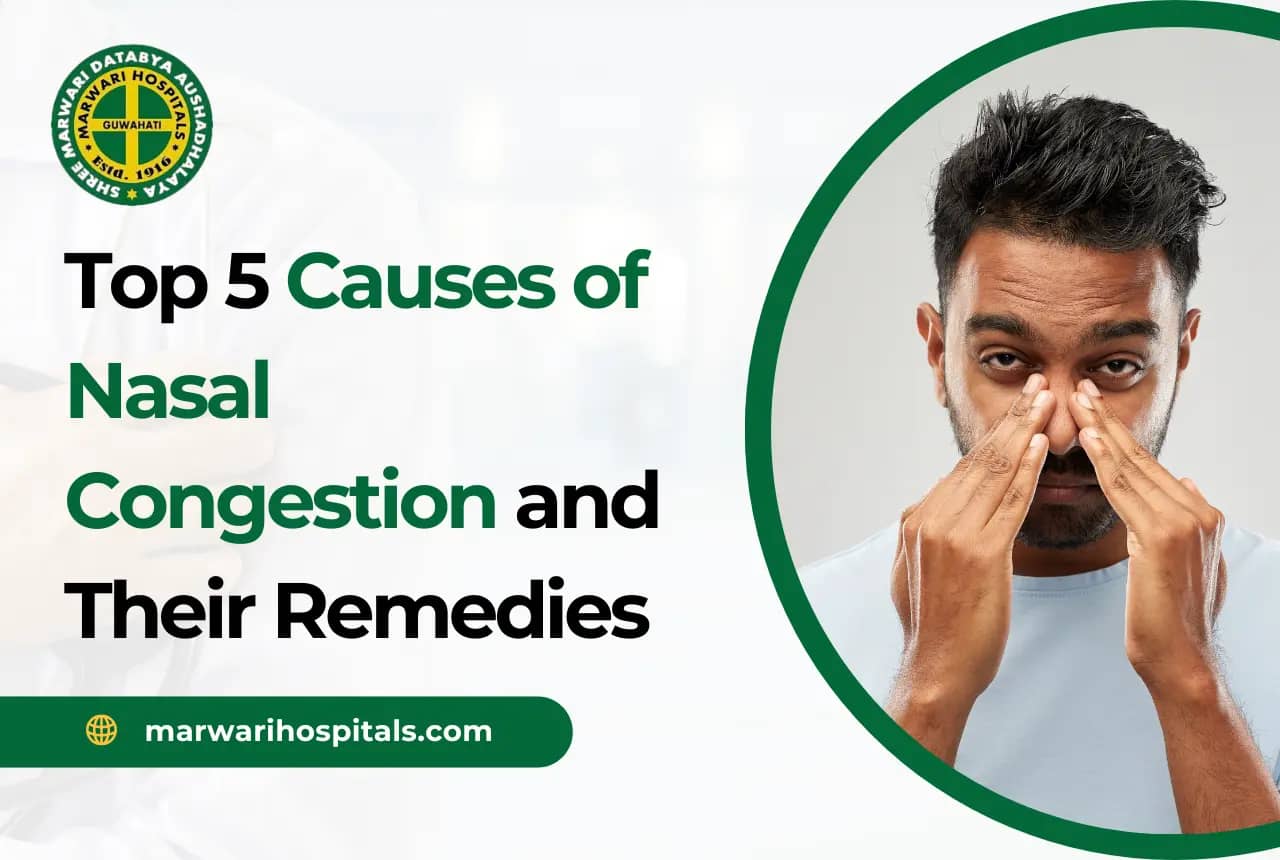There are multiple causes of congestion and nasal congestion is one of the ones that could be the most irritating. As our nasal passages are more than just air tunnels within the nose, they also act as the primary pathway for entering and exiting the respiratory system. Yet the nose is capable of much more than that. Working as a mini machine, when air enters your nose, it gets warmed, humidified, and filtered before reaching your lungs. Hence they protect your lungs from irritants and keep them functioning properly.
As there are different causes of nasal congestion, the phenomenon is commonly referred to as a stuffy nose, which occurs when the tissues lining the nasal passages become inflamed and swollen. There could be a narrowing of the airways, making it difficult to breathe through your nose during the time of inflammation.
Let us look at some common factors that cause nasal congestion and symptoms of nasal congestion:
- Stuffiness or blockage in the nose.
- Runny or dripping nose.
- Sinus pressure in your face.
- Reduced sense of smell or taste.
When facing or experiencing nasal congestion, there could be several home remedies and over-the-counter medications that could work wonders to help you relieve your symptoms. But, if you feel like the congestion is severe or long-lasting, it is advised to see the doctor of Marwari Hospital ENT specialists to rule out any underlying health conditions or any other medical issues.
The 5 Main Causes of Nasal Congestion
Several culprits can trigger a stuffy nose. The usual suspects are the ones that include are – common cold and flu, viruses cause both. Allergies triggering elements like pollen, dust mites, and pet dander can also inflame nasal passages. There are also environmental irritants like smoke and fumes which can have a similar effect. And when looked into it lastly, structural abnormalities inside the nose, like a deviated septum, can contribute to chronic congestion and other issues.
Cause #1: The Common Cold

When it comes to nasal congestion, the common cold is a champion in it. Caused by a variety of viruses that invade the upper respiratory tract, this includes the nose and throat. These viruses are known to irritate and inflame the lining of the nasal passages, which causes the tissues to swell and produce a great amount of mucus. The increased mucus production, along with the inflamed tissues, leads to a congested feeling and a runny nose that irritates the one facing the issue.
As there are no magical solutions to curing a common cold, there are self-care and medical remedies that can help to ease your symptoms which will make you feel better in the long run. Try getting plenty of rest, as it allows your body to focus on recovering energy and fighting off the viruses causing the cold. Another remedy is drinking plenty of fluids ranging from water, broth, or warm lemon water, which helps to thin the mucus and keeps your nasal passages moist. A saltwater gargle can work wonders to soothe a sore throat, and a humidifier could moisturize the air making it easier to breathe.
So next time a cold tries to steal your breath away, fight back with rest, fluids, and self-care!
Cause #2: Allergies

Allergies are a type of nasal congestion that is caused by an overenthusiastic response by your immune system to seemingly harmless substances called allergens, it is different from the common cold which is mostly caused by viruses. It is caused by inhaling allergens, like pollen or dust mites, which are identified by your immune system as a threat. These triggers are known to release chemicals called histamines from immune cells in your nose. Histamine is known to cause the blood vessels in your nasal passages to dilate, which leads to inflammation, swelling, and increased mucus production.
The usual suspects in allergy-induced congestion include:
- Airborne allergens: Pollen from trees, grasses, and weeds, as well as mould spores, can wreak havoc on your nasal passages during specific seasons.
- Dust mites: These microscopic creatures live in dust and bedding, and their shed skin and body parts can be potent allergens.
- Pet dander: Tiny flakes of skin shed by cats, dogs, and other furry friends can trigger allergy symptoms.
When you have a stuffy nose, that isn’t the only clue your body might be overreacting to. Sometimes allergies often come with a party of unwelcome guests, which includes itchy, watery eyes, sneezing, a scratchy throat, and even a post-nasal drip – (which is mucus dripping down the back of your throat).
Equipped with excellence, Marwari Hospital is the best medical centre to cure all your medical issues. Ranging with different medications for example – Antihistamines work by blocking the effects of histamine, reducing inflammation and congestion. Nasal corticosteroids are powerful anti-inflammatory medications delivered as a spray directly to the nose. Other options include decongestants and allergy immunotherapy (allergy shots) for long-term management.
Cause #3: Sinusitis

Sinusitis is an extravagant approach to saying your sinuses are kindled and one of the major causes of nasal congestion. Sinuses are air-filled pits in front of you that assist with bodily fluid seepage, humidification of air, and, surprisingly, a few parts of smell. When these become excited, they get hindered by bodily fluid, prompting an unheard-of degree of blockage.
There are two main types of sinusitis:
- Acute sinusitis: This is a short-term inflammation, often lasting less than 4 weeks, usually triggered by a viral infection like the common cold.
- Chronic sinusitis: This is a long-term condition where inflammation persists for at least 12 weeks despite treatment.
While a stuffy nose is a common symptom of both, sinusitis often comes with a more intense set of party crashers:
- Facial pain and pressure: You might feel a throbbing or aching pain around your forehead, cheeks, or eyes, especially when bending over.
- Fever: A low-grade fever can accompany sinusitis, especially in acute cases.
- Thick, colored mucus: Unlike a clear runny nose from allergies, sinusitis often produces thick yellow or green mucus.
- Postnasal drip: This can cause a sore throat, cough, and even bad breath.
The treatment for sinusitis relies upon the sort and seriousness. For intense sinusitis, home cures like applying warm packs, utilizing a humidifier, and a saline nasal water system can be exceptionally powerful. At times, antimicrobials may be endorsed to fend off bacterial contaminations. Persistent sinusitis might require a mix of prescription, nasal showers, and, surprisingly, insignificantly intrusive strategies to clear impacted sinuses.
Cause #4: Deviated Septum
A veered-off septum is a condition where the mass of ligament and bone isolating your nose is askew. This misalignment can happen because of a facial physical issue, formative reasons during development, or even availability upon entering the world.
A deviated septum itself doesn’t necessarily in every case cause issues. Nonetheless, a serious deviation can limit your nasal entries, prompting a constantly stodgy nose or trouble breathing through one or two nostrils. Different side effects can include:
- Facial pressure or pain on one side of the nose
- Frequent nosebleeds, especially in dry climates
- Noisy breathing or snoring during sleep
- Recurrent sinus infections
Diagnosis of a deviated septum usually involves a physical exam where your doctor examines the inside of your nose. In some cases, a nasal endoscopy, a thin lighted tube inserted into the nose, might be used for a more detailed view.
Cause #5: Dry Air

While we often think of allergens and viruses as the main foes of clear nasal passages, dry air can be a surprising culprit behind congestion. Healthy nasal passages have a moist lining that traps dust, allergens, and other irritants. When the air we breathe lacks moisture, this lining dries out, becoming irritated and inflamed. This can lead to swelling and mucus production, making it harder to breathe and giving you that stuffy feeling.
Several factors can contribute to dry air, including:
- Winter weather: Colder air naturally holds less moisture than warm air.
- Indoor heating: Furnaces and space heaters can significantly dry out the air inside your home, especially in winter.
- Air conditioning: While AC cools the air, it can also remove moisture in the process.
A stuffy nose isn’t the only party guest dry air brings along. You might also experience a sore throat, dry cough, and even irritated and itchy eyes.
To combat dryness and breathe easier, there are a few simple remedies:
- Humidifiers: Adding moisture to the air with a cool-mist humidifier can help ease congestion and soothe irritated nasal passages.
- Saline nasal sprays: These sprays deliver a saltwater solution that can help moisten and soothe dry nasal passages.
- Drinking plenty of fluids: Staying hydrated helps thin mucus and keeps your nasal membranes moist from the inside out.
When to See a Doctor for Nasal Congestion

Most nasal congestion resolves or recovers on its own within a week or two, but there are times when it’s best to see a Marwari Hospital Doctor. Let us look into the signs that warrant a visit to The Marwari Hospital, Guwahati:
- Severe or persistent pain: Facial pain, especially around the eyes or forehead, that is intense or doesn’t improve with home remedies is a cause for concern.
- Fever: A high fever (above 101°F) accompanying your congestion could signal a bacterial infection.
- Facial swelling: Noticeable puffiness or swelling around your eyes or cheeks can indicate an underlying sinus infection.
- Thick, colored mucus: Greenish or yellow mucus, especially if persistent, might point to a bacterial sinus infection.
- Symptoms lasting more than 2 weeks: If your congestion persists for over two weeks with no improvement, it’s wise to consult a doctor to rule out any chronic conditions.
Takeaway
From common colds to allergies and dry air, many culprits can cause a stuffy nose. While home remedies can often help, knowing when to see a doctor is important. If your congestion lingers or worsens, don’t hesitate to seek professional help for clear breathing and happy sinuses.

